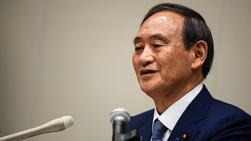 Japan's chief cabinet secretary Yoshihide Suga attends a press conference to announce his candidacy for the Liberal Democratic Party (LDP) leadership in Tokyo on September 2, 2020. (PHOTO/AFP)
Japan's chief cabinet secretary Yoshihide Suga attends a press conference to announce his candidacy for the Liberal Democratic Party (LDP) leadership in Tokyo on September 2, 2020. (PHOTO/AFP)
TOKYO - Japanese Chief Cabinet Secretary Yoshihide Suga looks set to become prime minister this week, after garnering the backing of most of the ruling Liberal Democratic Party’s (LDP) factions to win a party leadership election slated for Monday.
Suga also plans to maintain Abe’s policy of prioritising economic growth over efforts to fix the country’s tattered finances
Incumbent premier Shinzo Abe announced last month he was resigning because of poor health. The winner of the party election is virtually assured of becoming prime minister because of the LDP’s parliamentary majority.
Here is where Suga stands on key policies.
ECONOMY
A longtime lieutenant of Abe, Suga aims to continue the incumbent’s hyper-easy monetary policy, stepped-up government spending and structural reforms, dubbed “Abenomics”.
Suga also plans to maintain Abe’s policy of prioritising economic growth over efforts to fix the country’s tattered finances.
ALSO READ: Japan's Suga to promote diplomacy with Asian neighbors
He said on Sunday there was no limit to the amount of bonds the government can issue to support an economy battered by the coronavirus pandemic, and indicated he could look to a third extra budget to fight the economic downturn.
“Only when we have economic growth can we push through fiscal reform,” Suga said.
Suga has voiced his readiness to have the central bank take additional easing steps to protect jobs.
He opposes lowering the 10 percent sales tax rate. Some lawmakers have proposed cutting the tax to reduce the burden of the pandemic on households.
A son of a farmer from northern Japan, Suga counts the revitalisation of the regional economy as one of his key priorities.
REFORMS
As a strong proponent of reforms, Suga favours greater consolidation of regional banks and has also reiterated his intention to ask mobile phone carriers to lower fees, which he has advocated during Abe’s tenure.
He aims to form an agency to promote the government’s digital strategies under one roof and said in a recent newspaper interview that he will look into a possible overhaul of the health ministry.
READ MORE: Japan's outgoing PM Abe goes back to hospital, Kyodo says
“On becoming the LDP president, I would break down the vertically segmented administrative system, get rid of vested interests ... and do my best to push ahead with regulatory reforms,” Suga said last week.
He urges companies to set hiring targets to help women’s advancement in society, and proposes insurance coverage for fertility treatments.
Suga said on Sunday he would like to appoint reform-minded lawmakers to cabinet posts if he were to become prime minister.
DIPLOMACY, SECURITY
Suga regards Japan’s alliance with the United States as the mainstay of Tokyo’s diplomacy and security, and seeks stable ties with neighbouring countries including China.
Suga has said he is willing to meet with Democratic People’s Republic of Korea (DPRK) leader Kim Jong Un with no preconditions.
READ MORE: Abe tells Trump Japan-US alliance will remain strong
He is for revising the US-drafted pacifist constitution, a much cherished goal of Abe that ultimately eluded the outgoing prime minister.
Asked about his position on Japan possibly acquiring the capability to strike enemy targets last week, he said he would first observe ruling party debate, without specifying where he stands on the issue.
Suga on Saturday defended his experience in diplomacy, an area where experts say his resume is rather thin, by saying he has been involved in all the major foreign policy decisions under Abe.
CORONAVIRUS AND BEYOND
Suga aims to boost coronavirus testing capacity and secure enough vaccine for Japan’s entire population by the middle of next year.
He is a strong promoter of tourism as a way to drive local economies and signalled in a recent interview with Reuters the importance of re-opening the economy and also ensuring that the pandemic is contained.
In the interview he also stressed that Japan would do “whatever it takes” to ensure it could host the Olympics next year. The event was originally planned for this summer but postponed for a year due to the pandemic.
He has said preventing the spread of the coronavirus will take priority in any decision on holding a snap election.


